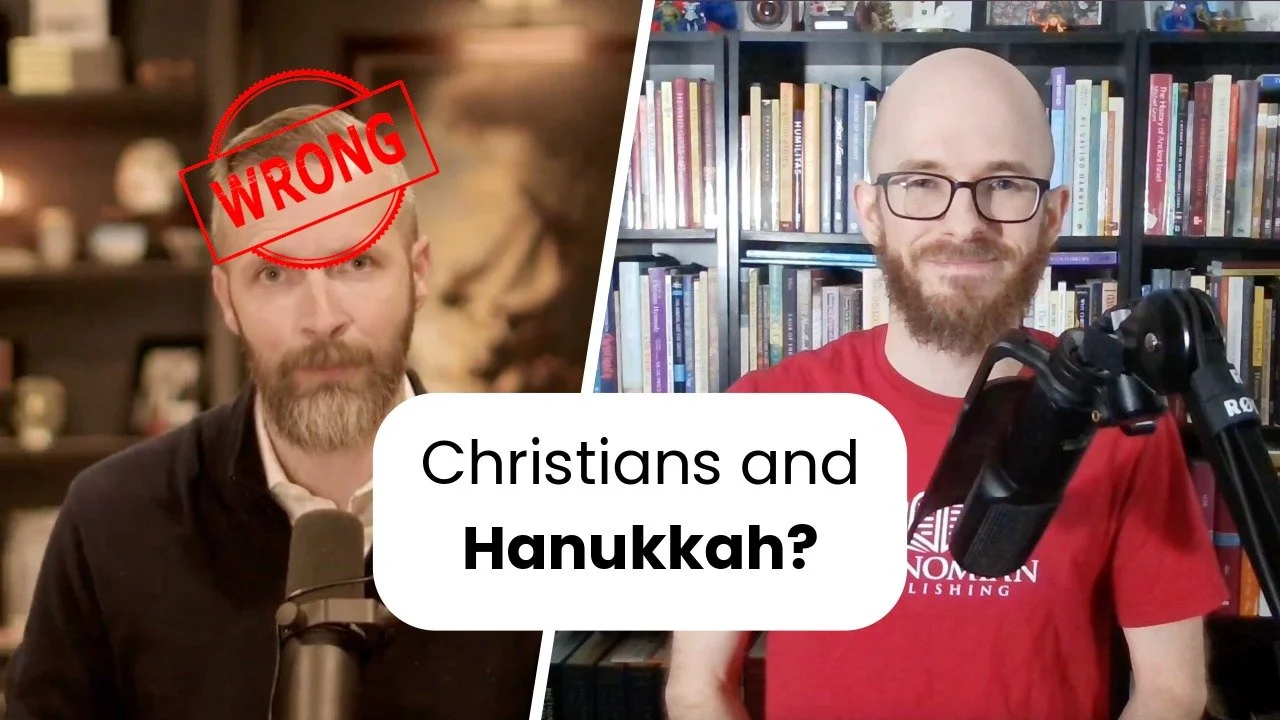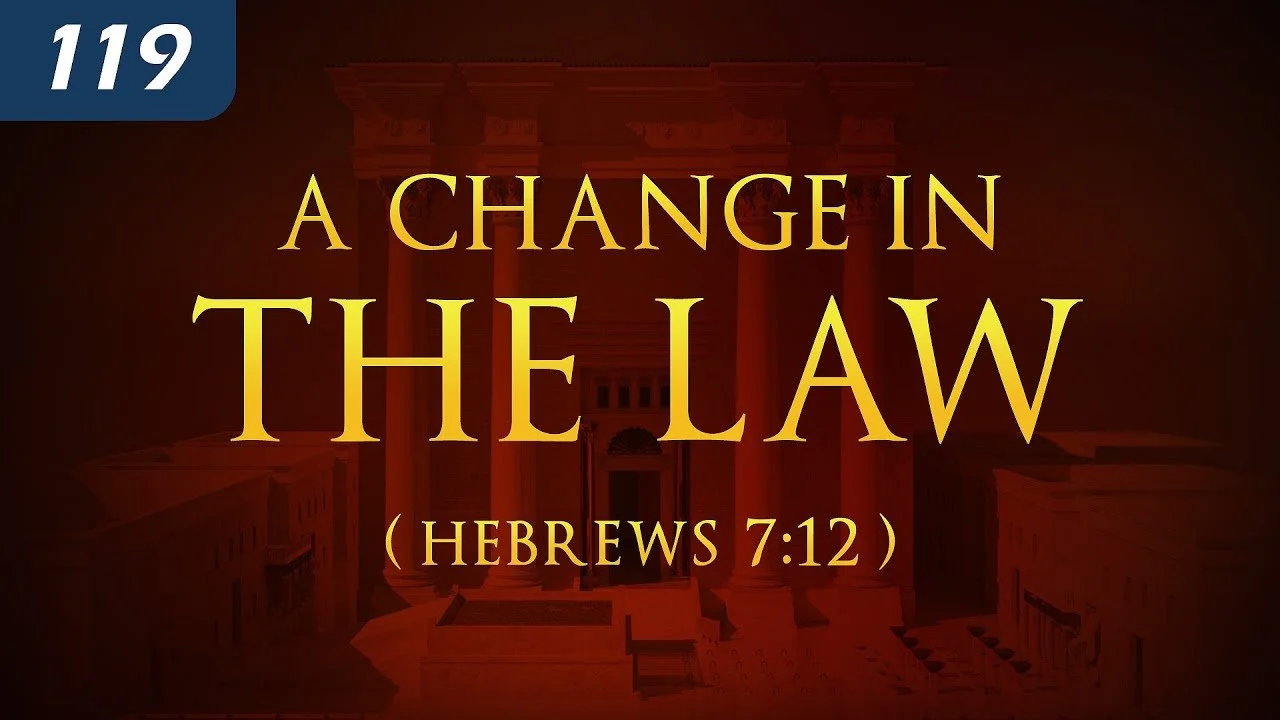Dale Partridge claims that faith in Christ and support for Hanukkah are incompatible. However, as this video demonstrates, his arguments supporting this claim are theologically incoherent.
Candace Owens is Wrong About Christians and the Sabbath
The Messiah's Name is Not "Yahusha"
Nick Fuentes is Wrong About the Law of Moses, Israel, and the New Testament
What is Pronomian Theology?
Pronomian theology, or pronomianism, is a way of reading Scripture that affirms the ongoing authority of God’s Law given through Moses (Torah). In this video, we explore how pronomianism contrasts with antinomianism and how various Christian communities like Messianic Judaism and the Seventh Day Baptists approach the Torah today. If you’ve ever wondered about the relevance of commandments such as the Sabbath, festivals, and food laws in Christian ethics, this short video will give you a basic introduction to pronomian theology.
Love and the Law: A Pronomian Reading of John 14:15 (Interview w/ Dr. Benjamin Szumskyj)
Jesus told his disciples, “If you love me, you will keep my commandments.” But what exactly did he mean his commandments? Was he referring only to the commandment to love, only to the teachings given during his earthly ministry, or also to the commandments found in the Torah (Law of Moses)? That is the subject of the new book by Dr. Benjamin Szumskyj titled Love and the Law: A Pronomian Pocket Guide to John 14:15. I’m excited to have Dr. Szumskyj with us to today discuss his book on this important verse.
It is Not "Satanic" to Agree with the Apostolic Decree
A popular account on X (formerly Twitter) recently labeled me a “Judaizer” for agreeing with the Apostolic Decree in Acts 15:20. Other folks then piled on, calling me “Satanic,” a “heretic,” and all sorts of other names. In this video, I’ll explain why it should not be controversial to believe that the four commandments of the Apostolic Decree are still relevant. As I’ll demonstrate, these four commandments are consistently affirmed throughout the New Testament and early Christian writings.
Did Peter's Vision in Acts 10 Abolish God's Food Laws? (Interview w/ R. M. Bailey)
Did God revoke his food laws? Did he abolish the distinction between clean and unclean animals? Many argue that he did based on Peter’s vision in Acts chapter 10. However, recent scholarship is challenging that interpretation. In his new book, Whom God Has Made Clean: A Pronomian Pocket Guide to Acts 10:9–15, my guest, R. M. Bailey, argues that Peter’s vision isn’t about food at all. Bailey challenges popular antinomian interpretations and offers a pronomian reading that better fits both the immediate context and the broader biblical narrative. I’m excited to talk to him about this important passage.
"Nothing is Unclean"? Examining Romans 14:14 (Interview w/ Rob Vanhoff)
What did Paul mean in Romans 14:14 when he wrote, "nothing is unclean in itself"? Did he believe that the Torah's distinction between clean and unclean food had been erased? Or is he talking about something else entirely? Joining me today to discuss this is Rob Vanhoff. He is a biblical scholar, author, and instructor at TelosTorah Bible Academy. I'm excited to have Rob with us to talk about this passage.
Marital Intimacy on the Sabbath: Does it Violate the Commandment?
What Wes Huff Got RIGHT About the Sabbath on the Joe Rogan Experience
A Change in the Law (Hebrews 7:12)
In Hebrews 7:12, the author announces, “For when there is a change in the priesthood, there is necessarily a change in the law as well.” Many have taken this to mean that the Levitical priesthood and the entire Law of Moses has been overturned. But is that really what the author of Hebrews is saying? Actually, there are some major problems with this interpretation.
James Understood the Gospel. Matt McMillen Does Not.
A Christian TikTok/Instagram influencer named Matt McMillen claims that James did not fully appreciate the Messiah’s work on the cross and did not understand the gospel. He bases this claim on James’s affirmation of the ongoing validity of the Law of Moses, which McMillen views as conflicting with the Gospel. In this video, I interact with McMillen's objections.
Keep Torah Better Than the Scribes and Pharisees (Matthew 5:20)
Jesus taught that the Law of Moses is not abolished (Matthew 5:17), that it will remain in force for as long as heaven and earth endure (Matthew 5:18), and that his followers must obey and teach it (Matthew 5:19). Now, in Matthew 5:20, he demands that his followers surpass the righteousness of the scribes and Pharisees. But what does it mean to surpass their righteousness? In this video, we will explore this question in detail.
Developing Biblical Friendships | Pronomian Scholarship (Interview w/ Dr. Benjamin Szumskyj
Are our friendships important to God? How do we build deep, meaningful friendships rooted in faith and Scripture? I’m excited to explore these questions today with Dr. Benjamin Szumskyj. In his recent book, Dr. Szumskyj reflects on how we can cultivate godly friendships, drawing inspiration from the bond between David and Jonathan in Scripture. He also shares his perspective on Pronomian (pro-Law/Torah) theology, and his experience advocating for this this view within the academic world. I hope you’re blessed by the discussion.
I Did NOT Mischaracterize Dr. Averbeck's Views on the Law of Moses
Andrew Schumacher has accused me of mischaracterizing Dr. Richard Averbeck’s position on the Law of Moses during my interview with him. So, I decided to show some clips from the interview, which debunk Andrew's accusation. Furthermore, I reached out to Dr. Averbeck directly to ask him if he thought that I misrepresented him. In this video, I’ll show you what Dr. Averbeck said.
Andrew Schumacher Caught Lying About My Use of Scholarship
A YouTuber named Andrew Schumacher recently published a hit piece where he tries to discredit me for my use of scholarly resources, accusing me of appealing to scholars in a misleading way. This isn’t the kind of video I typically enjoy making, but I believe it’s important to address for the reasons I explain in the video. Here, I respond to Andrew’s claims point by point. I hope this will be helpful and encouraging to you!
Do and Teach the Torah's Commandments (Matthew 5:19)
After declaring that he did not come to abolish the Law and the Prophets but to fulfill them, and that the whole Law of Moses will remain in effect as long as heaven and earth exist (Matthew 5:17-18), Jesus urges his followers to obey and teach the Torah’s commandments (Matthew 5:19). In this video, we will look at Matthew 5:19 and unpack Jesus's warning against disregarding the Torah's commandments and his call to be great in the kingdom by doing and teaching them. We will also address the claim that Jesus was not referring to the Torah's commandments in Matthew 5:19 and explore why the context contradicts that interpretation.
Celebrate the Festival (1 Corinthians 5:7-8)
Let No One Judge You: Sabbaths, Festivals, and Foods (Colossians 2:16-17)
Colossians 2:16-17 is often cited to argue that the Sabbath, festivals, and food laws are no longer relevant for believers, seen as "shadows" superseded by Christ, with Paul advising the Colossians not to let anyone judge them for disregarding these practices. However, an increasing number of New Testament scholars are challenging this interpretation. These scholars argue that the Colossians were not being judged for neglecting the Sabbath and festivals but were actually facing criticism for keeping them.





















